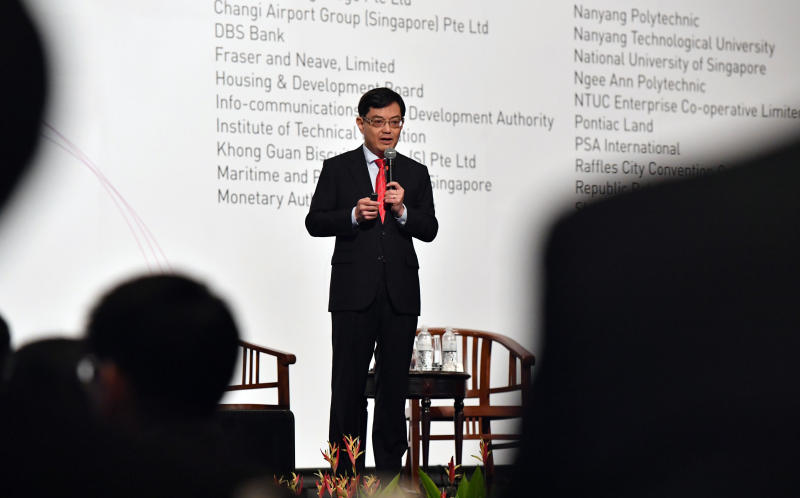More can be done to meet needs of older Singaporeans: Heng Swee Keat
Younger leaders looking at issue; minister hints at Budget measures to support seniors
Sign up now: Get ST's newsletters delivered to your inbox

Finance Minister Heng Swee Keat also hinted that measures to better support seniors will be a focus at the upcoming Budget on Feb 19, saying: "Please be patient, wait for the Budget, and we will talk about this."
ST PHOTO: DESMOND FOO
A group of younger leaders have banded together to mull over what Singapore "needs to do differently in the coming years" as its population ages, underscoring how the issue has become one of the most urgent challenges for the Government.
Finance Minister Heng Swee Keat yesterday also hinted that measures to better support seniors will be a focus at the upcoming Budget on Feb 19, saying: "Please be patient, wait for the Budget, and we will talk about this."
At the Singapore Perspectives conference organised by the Institute of Policy Studies (IPS), Mr Heng said a group of leaders including Health Minister Gan Kim Yong, Minister for Culture, Community and Youth Grace Fu, Minister for Social and Family Development Desmond Lee and Speaker Tan Chuan-Jin are pondering the challenges the aged in Singapore face.
They "are very concerned and are working together on this", he added. It is not starting from scratch, he said, noting that the Government had established, in 2007, a Ministerial Committee on Ageing, which is now chaired by Mr Gan.
Mr Heng did not give further details of the group.
Older Singaporeans, he noted, face a slew of diverse worries.
Based on feedback garnered by pioneer generation ambassadors, the senior citizens are concerned about matters from healthcare needs to loneliness to finance - all currently addressed by different agencies and ministries. "What it shows very clearly is there is a gap at the front line, in terms of how well we are delivering that service to the seniors who need it," said Mr Heng.
And so, going forward, "we will have to think about looking at the issues in a more cross-disciplinary way, across agencies and ministries", he added, saying the Government has to find ways for them to work better together. "Practically every ministry will have to deal with this demographic transition."
Singapore today has around 500,000 people aged 65 and above. This is expected to almost double to around 900,000 by 2030.
At the conference, which was focused on ageing, Deputy Prime Minister Teo Chee Hean, who oversees the National Population and Talent Division, said more can be done to support seniors, such as redesigning jobs to help them continue to work and helping them to take part in the gig economy.
One concern about Singapore's ageing population is the toll it could take on the economy. An IPS study said it will cause a drag of 1.5 percentage points on per capita gross domestic product growth annually until 2060, assuming zero immigration and a stagnant fertility rate.
Monetary Authority of Singapore managing director Ravi Menon yesterday said that the economy can remain dynamic - provided that certain steps are taken.
For instance, he noted, Singapore's childcare workers earn just 38 per cent of the national median wage. Those in Australia pull in earnings at 91 per cent of the national median. This shows the scope that Singapore has to "professionalise" such rank-and-file jobs, which would help the economy remain competitive as the workforce ages.
The Republic should also be increasingly concerned about the skills of the foreign workers that it takes in, rather than just the numbers, he added.
"In fact, more skilled foreign workers will mean that we will need less of them," said Mr Menon, adding that as Singapore pursues innovation, it will need to attract highly skilled intellectual capital that it may not already have.
As a global city, Singapore cannot afford to grow too slowly, he warned. "Many leading global cities grow at about 2.5 per cent to 3.5 per cent, faster than the national average of the countries that they are a part of. London has averaged 3.3 per cent annual growth since the financial crisis. Sydney, 2.9 per cent."
A city whose growth comes in under 2 per cent annually will be unattractive to investors and talent, including its own, he said.
Singapore's economy last year grew 3.5 per cent. This came after it expanded just 2 per cent and 1.9 per cent in the previous two years.


